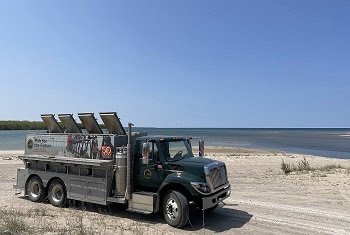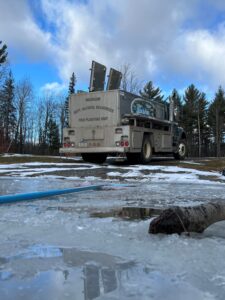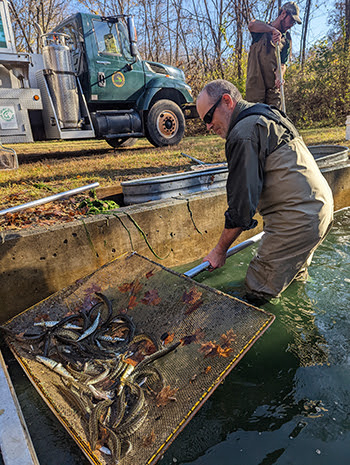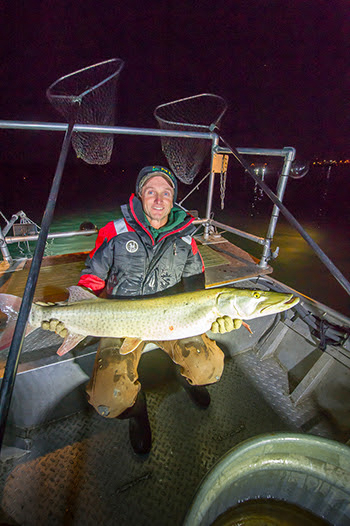MI DNR pausing muskellunge program due to disease concerns

The Michigan Department of Natural Resources today announced it will not collect eggs from Great Lakes muskellunge in the Detroit River this month due to recent fish kills in Lake St. Clair that are attributed to a confirmed, widespread infection of viral hemorrhagic septicemia virus (VHSv).
DNR employee holding up muskellungeNormally, the DNR collects eggs from the Detroit River’s muskellunge population to be reared at Wolf Lake State Fish Hatchery in Mattawan and stocked each fall in Michigan waters throughout the state. With an increasing number of dead muskellunge being found in the Detroit River, and the confirmed presence of VHSv in Lake St. Clair, DNR fisheries managers feel the risk of contaminating this hatchery is too great to proceed with this year’s rearing efforts.
VHSv is a contagious pathogen that causes the fish’s blood vessels to leak, which can show as bloody patches on the skin. It is known to infect more than 30 species of Great Lakes fish and has been found in lakes Superior, Huron, Erie and Ontario, along with a few inland lakes. Some species such as lake sturgeon and walleye are very resistant to it, while others including bluegill, largemouth bass, muskellunge, gizzard shad and round goby are very susceptible.
“VHSv has never been found in one of our state fish hatcheries and it is our intent to keep it that way,” said the DNR’s fish production manager, Ed Eisch. “We know it is safer to place our muskellunge rearing program on hold this year rather than bringing in these Detroit River muskellunge eggs and risk infecting our hatchery. We know this particular pathogen has been in the Lake St. Clair/Detroit River system since the early 2000s, so there’s always some level of risk associated with bringing eggs from that area to a hatchery. However, the risk goes up significantly when the eggs are collected during an active disease outbreak.”
If VHSv was found at Wolf Lake State Fish Hatchery, there is a likelihood the facility – possibly including all steelhead and Chinook salmon – would need to be depopulated (destroyed and landfilled), which would affect future fish stocking efforts and fishing opportunities statewide.
The DNR has been working for several years to develop additional egg sources for its muskellunge rearing program, but the populations at these brood lakes are still under development and are not at a point where they can serve in that role this year.
“The tests we use to detect VHSv are good, but they are not 100 percent guaranteed,” said Eisch. “The last thing we want to do is move this virus to lakes where it currently does not exist. That’s especially true for the future brood lakes. The risk of inadvertently moving this pathogen around is much higher during an active outbreak year.”
Muskellunge are a long-lived species. The DNR is confident having a one-year gap in its stocking efforts will not be a real detriment to this fishery or to the program.
The DNR will continue to monitor the VHSv situation in Lake St. Clair and surrounding waterbodies. For more information on managing Michigan’s fisheries, visit michigan.gov/fishing.
Contact: Ed Eisch, 231-922-6055 or Gary Whelan, 517-284-5840






